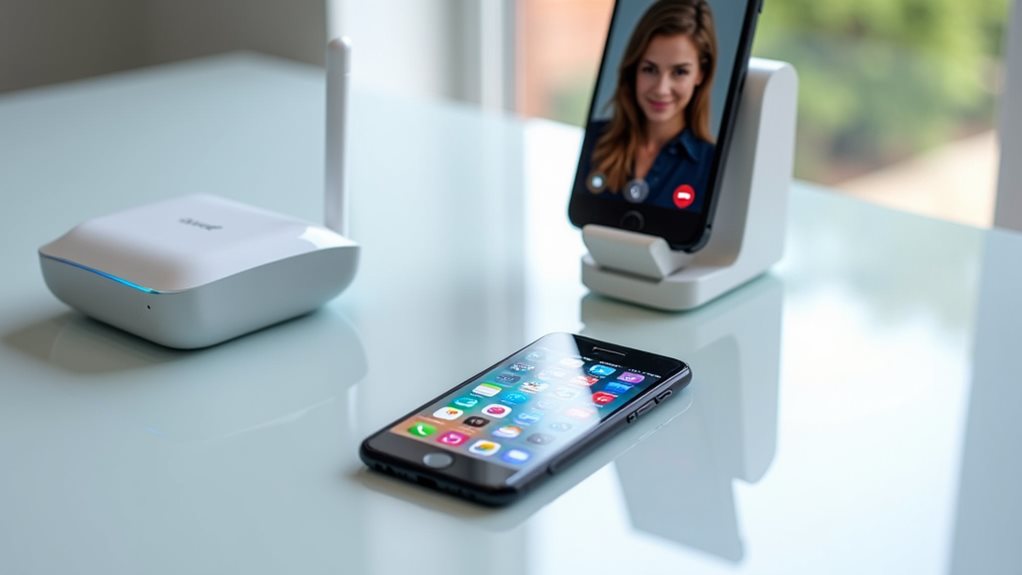Your smartphone can definitely use VoIP technology through various apps like WhatsApp, Skype, and Facebook Messenger. These apps convert your voice into digital signals and transmit them over the internet, letting you make calls using either Wi-Fi or cellular data instead of traditional phone networks. You'll need a minimum internet speed of 1 Mbps for ideal call quality, but you can save up to 60% compared to regular phone services. While VoIP calls depend on internet connectivity, they offer advanced features like video conferencing and file sharing that traditional calls can't match. There's much more to discover about how VoIP is revolutionizing smartphone communication.
Understanding VoIP Technology Today
Voice over Internet Protocol (VoIP) has revolutionized how we communicate by transforming traditional phone calls into digital data that travels over the internet. You'll find this technology working behind the scenes whenever you're making calls through popular apps or modern business phone systems, converting your voice into data packets that zip across the internet.
When you're using VoIP, your voice undergoes a fascinating transformation. First, it's converted from analog to digital signals, then compressed and transmitted over IP networks. The process typically takes under one second to complete. This technology offers lower monthly fees compared to traditional landline services, and it relies on Session Initiation Protocol (SIP) to facilitate voice communication.
While VoIP quality challenges can arise from internet connectivity issues, you'll be pleased to know that modern systems implement sophisticated QoS measures to prioritize your voice traffic. Additionally, VoIP security measures protect your conversations from potential threats, ensuring your communications remain private and secure.
You're probably already using VoIP more than you realize, especially through your favorite messaging apps and video conferencing platforms. This technology's flexibility means you can make calls from virtually anywhere with an internet connection, whether you're using a traditional desk phone, your computer, or a mobile device equipped with VoIP capabilities.
Smartphones and VoIP Connection Methods
When setting up VoIP on your smartphone, you'll need to choose between Wi-Fi and cellular data connections, with Wi-Fi typically offering better call quality and lower costs. VoIP technology allows for flexible usage, enabling you to make calls from various devices beyond just smartphones.
Your network configuration options will depend on your VoIP service provider's requirements and your smartphone's capabilities, including settings for Quality of Service (QoS) and bandwidth allocation. Modern smartphones function as mobile softphones that enable VoIP calling through specialized apps. A minimum of 100 kbps bandwidth is required for optimal VoIP performance.
You can often switch between Wi-Fi and cellular data seamlessly, though you'll want to monitor your data usage if you're not on an unlimited plan.
Wi-Fi Vs Cellular Data
Modern smartphones offer two primary methods for making VoIP calls: Wi-Fi and cellular data connections.
When you're considering which option to use, it's important to understand how each affects your calling experience and budget. Wi-Fi calling typically provides excellent call quality when you're connected to a secure network, though you'll want to guarantee proper Wi-Fi security to protect your conversations. Mobile signal strength tends to vary by carrier coverage. Today's VoIP technology delivers crisp, clear calls with minimal latency when using either connection method. Additionally, using a wider bandwidth for Wi-Fi can enhance your overall VoIP call quality.
Cellular data offers greater flexibility since you're not tethered to a specific location, but you'll need to watch your data caps to avoid unexpected charges.
While Wi-Fi calling is usually free or very affordable, especially if you're already paying for home internet, cellular data can quickly consume your monthly allowance.
You'll find that Wi-Fi calls often deliver superior audio quality, provided you have a stable connection, whereas cellular data quality can fluctuate based on your location and network congestion.
When you're at home or in the office, Wi-Fi calling is your best bet, but cellular data becomes invaluable when you're on the move or in areas without reliable Wi-Fi coverage.
Network Configuration Options
Setting up VoIP on your smartphone requires several key configuration options to guarantee reliable calling performance.
You'll need to first confirm your network speed meets the minimum requirements of 1 Mbps for both upload and download speeds, which you can verify through a quick speed test on your device. For optimal performance, fiber optic broadband provides the most stable connection for VoIP calls, and having a reliable internet connection is crucial for maintaining high call quality.
To achieve ideal quality assurance, you'll want to configure your router's Quality of Service (QoS) settings to prioritize VoIP traffic. This step is essential when you're sharing your network with other devices or applications. VoIP utilizes specialized data compression codecs to maintain call quality while minimizing bandwidth usage.
Once you've selected your VoIP provider, you'll need to download their specific app and complete the account setup process. Many providers offer user-friendly configuration guides to help you through this process.
You've got multiple connection options available, including both Wi-Fi and cellular data networks.
If you're using a softphone app, you'll want to test your setup with a proper headset to confirm clear audio quality.
Remember to run test calls during different times of day to verify consistent performance, especially if you're planning to use VoIP for important business or personal communications.
VoIP Apps for Mobile Devices

Modern smartphones come with access to numerous VoIP apps, including popular choices like WhatsApp, Skype, and Viber, which let you make voice and video calls over the internet.
You'll find these apps offer essential features such as HD calling, encrypted communications, and group chat capabilities, making them versatile tools for both personal and professional use. Many VoIP solutions can help users achieve cost savings of 60% compared to traditional phone services. Additionally, services like Skype, WhatsApp, and Viber are widely adopted in Germany, ensuring a seamless communication experience.
Setting up these apps is straightforward – you'll typically need to download your chosen app from your device's app store, create an account, and grant necessary permissions for accessing your contacts and microphone. Most VoIP apps now take advantage of 3G/4G networks to provide reliable call quality when Wi-Fi isn't available.
Popular VoIP Mobile Apps
Throughout the mobile device landscape, numerous VoIP apps offer users flexible calling and messaging options. When examining current VoIP trends, you'll find both business-focused solutions like RingCentral and Nextiva, as well as popular free options such as WhatsApp and Skype. VoIP comparisons show that each app brings its own unique features to enhance your communication experience.
For business needs, you'll discover that apps like Zoom Phone and Mitel integrate seamlessly with existing workflows, while platforms like Aircall provide specialized features for team collaboration.
If you're looking for personal use options, you've got plenty of choices, including Facebook Messenger and LINE, which offer free voice and video calls along with messaging capabilities.
What makes these apps particularly attractive is their cost-effectiveness and advanced features. You'll appreciate how they work across different devices, letting you stay connected whether you're at your desk or on the go. Additionally, many apps emphasize end-to-end encryption, ensuring your communications remain private and secure.
With features like call recording, voicemail transcription, and team collaboration tools, these apps transform your smartphone into a powerful communication hub that adapts to your specific needs.
VoIP App Key Features
VoIP apps for mobile devices come packed with powerful features that transform basic smartphones into extensive communication hubs. You'll find yourself equipped with tools like unified messaging, video conferencing, and seamless file sharing that make staying connected with your team or clients easier than ever.
When you're considering VoIP security, you'll appreciate the advanced call encryption that protects your sensitive conversations and data. The VoIP scalability aspect means you can easily add team members as your business grows, without the hassle of complex hardware installations.
You'll also benefit from features like simultaneous ring on multiple devices, guaranteeing you never miss important calls. The productivity-enhancing capabilities will revolutionize your workflow.
You can integrate your CRM systems for instant access to customer information during calls, utilize voicemail transcripts to save time, and leverage detailed analytics dashboards to monitor your communication patterns.
Moreover, the enhanced call routing abilities of VoIP systems optimize call management and improve customer satisfaction, ensuring you remain highly responsive to client needs. With features like three-way calling and conference rooms, you're always just a tap away from collaborative discussions. Whether you're working remotely or managing an international team, these VoIP features guarantee you're always professionally connected and efficient.
Setup and Installation Guide
Setting up a VoIP app on your mobile device starts with a thorough network assessment. You'll need to verify your internet connection maintains at least 100kbps bandwidth per call, and it's worth running a speed test to check for potential issues like jitter or packet loss. For the best experience, you'll want a stable Wi-Fi connection with proper QoS settings if you're sharing bandwidth with others.
Once your network's ready, head to your device's app store to download your chosen VoIP provider's application. You'll need to follow the installation prompts and enter your SIP credentials, including username and password.
During setup, you'll configure essential server information and protocol settings to guarantee proper VoIP security measures are in place. Additionally, ensure your network configuration aligns with your VoIP provider's necessary dial plans to optimize call quality and performance.
If you encounter any issues during the process, VoIP troubleshooting typically starts with checking your network connection and app settings. Make sure you've entered all server information correctly and that your app is up to date.
Don't hesitate to consult your provider's support resources if you need additional guidance. Remember to regularly update both your VoIP app and device's operating system to maintain peak performance and security.
Benefits of Mobile VoIP Calling
Mobile VoIP calling delivers substantial advantages that transform how businesses and individuals handle their communication needs. You'll experience significant cost reduction through the elimination of traditional phone expenses, roaming charges, and hidden fees that typically inflate your bills.
The communication flexibility you gain allows you to conduct business from anywhere, using your existing devices while maintaining professional standards.
When you adopt mobile VoIP, you're joining a community of forward-thinking communicators who value efficiency and smart technology. You'll have access to extensive features that go beyond basic calling, including video conferencing, screen sharing, and integrated messaging systems.
Your business can seamlessly connect with CRM software while providing advanced capabilities like call recording and analytics. Furthermore, this technology allows for significant cost savings and affordability, making it an ideal choice for small businesses looking to thrive.
The operational benefits you'll receive extend far beyond basic savings. You can reduce office space costs by enabling remote work, cut travel expenses through video conferencing, and boost employee satisfaction by allowing them to use familiar devices.
With auto attendants handling routine calls, you'll free up valuable time for your team while maintaining professional communication standards that keep you competitive in today's market.
Cellular Network Vs Voip Calls

The fundamental differences between cellular networks and VoIP calling systems shape how you'll experience mobile communication. When you're choosing between these technologies, you'll want to take into account both cellular advantages and VoIP limitations to make the best choice for your needs.
Traditional cellular networks offer you reliable coverage across wide areas, including remote locations where internet access might be spotty. You'll appreciate the dedicated infrastructure that guarantees your calls connect even when you're on the move.
However, you're likely to face higher costs, especially for international calls, and you might experience varying call quality depending on signal strength.
VoIP calling, on the other hand, brings you cost-effective communication with advanced features like call forwarding and conferencing. You'll enjoy high-quality audio when your internet connection is stable, and you'll save considerably on international calls. Additionally, the cost savings of up to 50% offered by VoIP compared to traditional landlines makes it an appealing option for many users.
Plus, you can use your number across multiple devices, which adds convenience to your daily routine. The main drawback you'll encounter is the dependence on internet connectivity – if your connection isn't reliable, your calls might suffer.
Reflect on your typical usage patterns and location when deciding which system better suits your communication needs.
Business Applications for Mobile VoIP
Building on the differences between cellular and VoIP systems, businesses have found remarkable advantages in implementing mobile VoIP solutions. You'll discover that mobile VoIP transforms your business productivity by integrating voice, text, and video communications into one unified platform, making it easier to manage your team's interactions from anywhere.
When you're running a modern business, remote collaboration becomes seamless with mobile VoIP's extensive features. You'll have access to high-quality video conferencing, instant messaging, and file sharing capabilities that keep your team connected and productive.
The system's flexibility allows you to scale your communication needs up or down as your business evolves, without investing in expensive hardware or dedicated phone lines.
You're also gaining a competitive edge through cost-efficient international calling and advanced features like visual voicemail and call routing. With 24/7 connectivity and reduced downtime, you'll maintain constant communication with clients and team members across different time zones.
The subscription-based model eliminates unexpected costs while providing access to premium features that enhance your business's professional image and operational efficiency.
Future of Smartphone VoIP Services

As smartphone technology continues to evolve, VoIP services are poised for revolutionary changes through 5G integration and AI advancements.
You'll notice future trends shifting toward faster, more reliable connections that'll transform how you communicate, with speeds up to twenty times faster than current 4G networks.
In the coming years, you'll experience enhanced security measures that'll protect your conversations through advanced encryption and AI-powered threat detection.
These developments mean you won't have to worry about your communications being compromised, while user adoption continues to grow across both personal and professional spheres.
The integration of AI will make your VoIP experience more intuitive, with features like real-time translation, smart call routing, and automated transcription becoming standard.
You'll be able to seamlessly switch between devices and networks while maintaining crystal-clear audio quality, even with multiple participants.
As these technologies mature, you'll find yourself part of a more connected world where traditional phone lines become increasingly obsolete.
Whether you're working remotely or traveling internationally, smartphone VoIP services will provide the flexibility and reliability you need to stay connected.
Frequently Asked Questions
Can Voip Calls Be Traced or Tracked by Law Enforcement?
Yes, law enforcement can trace your VoIP calls through established protocols. While VoIP privacy exists, authorities can track calls using warrants to access provider logs, IP addresses, and network data when legally authorized.
Does Voip Calling Drain Smartphone Battery Faster Than Regular Calls?
Yes, you'll notice your phone's battery consumption is typically higher with VoIP calls than regular cellular calls. It's because you're using data and processing power to maintain call quality through internet connections.
What Happens to Voip Calls During Power Outages?
During power outages, your VoIP calls won't work without power backup and internet connectivity. You'll need a UPS system to keep your equipment running, and it's smart to have call forwarding set up as backup.
Can Hackers Intercept Voip Calls on Smartphones?
Yes, your VoIP calls can be intercepted by hackers using methods like packet sniffing and man-in-the-middle attacks. You'll want to protect yourself by using strong encryption and keeping your smartphone's security features updated.
Do Voip Calls Count Towards My Cellular Minutes?
No, your VoIP services don't count towards cellular plan minutes since they use data instead. You're free to make calls over the internet while keeping your regular phone minutes separate and untouched.
Final Thoughts
As you navigate the evolving world of mobile communication, you'll find that VoIP technology has become an integral part of your smartphone experience. Whether you're making business calls through dedicated apps or connecting with family overseas, VoIP offers you flexibility and cost savings that traditional cellular calls can't match. With continuous improvements in internet connectivity and VoIP technology, you can expect even more innovative calling solutions in the years ahead.

